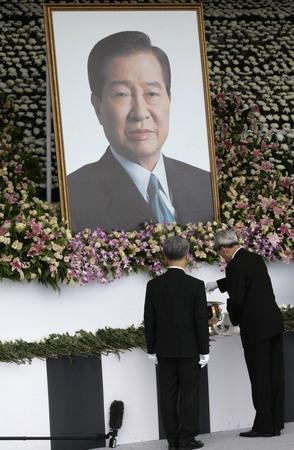SEOUL, Republic of Korea: A high-level delegation of the Democratic People's Republic of Korea (DPRK) officials paid their respects Friday to late former Republic of Korea's (ROK) President Kim Dae-jung, shaking his sons' hands and leaving a wreath at the National Assembly mourning site.
|

The Democratic People's Republic of Korea (DPRK) leader Kim Jong-il's close aide Kim Ki-nam (L), secretary of the Central Committee of the ruling Workers' Party, leading the DPRK delegation to the funeral, offers flowers to the deceased former ROK President Kim Dae-jung at a memorial altar at the National Assembly in Seoul August 21, 2009. [Agencies] 
|
The visit is the first to Seoul by the DPRK officials in nearly two years, and only the second time Pyongyang has sent a delegation to Seoul for mourning rites. Dressed in black, they laid a wreath emblazoned with the name of the DPRK leader Kim Jong-il at the altar for the former president.
Chief delegate Kim Ki-nam then burned incense, and the six-member delegation bowed before a large portrait of Kim Dae-jung before greeting his family.
The visit to mourn a man who devoted his presidency to building better relations with the DPRK raised hopes of improved ties on the tense Korean peninsula. Kim died Tuesday at age 85.
The two Koreas officially remain in a state of war because their three-year conflict ended with a cease-fire, not a peace treaty, in 1953.
Kim Dae-jung was respected on both sides of the border for his efforts to break down decades of postwar mistrust. His "Sunshine Policy" of reaching out to the DPRK with aid - highlighted by a historic summit with Kim Jong-il in 2000 - won him the Nobel Peace Prize.
The DPRK delegation's closely watched trip may provide a valuable opportunity for dialogue between the two Koreas, whose relations have deteriorated since the ROK President Lee Myung-bak, a conservative, took office last year, abandoning the Sunshine Policy.
Lee has said Pyongyang must follow through on its commitments on nuclear disarmament before receiving aid.
It was not clear whether the delegation, which includes spy chief Kim Yang-gon, would hold talks with the ROK officials before returning home Saturday. Unification Ministry spokesman Chun Hae-sung told reporters that no other itinerary for the delegation had been set.
Pyongyang has only dispatched a condolence delegation once before - a one-day trip in 2001 to mourn Chung Ju-yung, the founder of the ROK's Hyundai Group, which funded the first inter-Korean joint projects.
The visit is the latest conciliatory gesture by the DPRK after months of tensions as it conducted a nuclear test and test-fired a barrage of missiles, earning international condemnation and UN sanctions.
After former President Bill Clinton went to Pyongyang on Aug. 4 to secure the release of jailed American reporters Euna Lee and Laura Ling, holding talks during the visit with Kim Jong-il, the DPRK released a ROK national whom it had held for four months.
It also agreed to allow the resumption of some joint North-South projects suspended amid tensions with Seoul, and said it would lift restrictions on cross-border traffic in place since December and resume cargo train service across the border.
The DPRK diplomats, meanwhile, met for a second day Thursday in the United States with New Mexico Gov. Bill Richardson.
Richardson said they told him the DPRK was ready to discuss its nuclear program with Washington. Pyongyang abandoned six-nation talks on nuclear disarmament earlier this year. The governor described the discussions as "very positive."
But in a reminder of the state of war in the Korean peninsula, a DPRK military official warned that his country is braced for conflict with the US and the ROK.
The DPRk will deal a "merciless and immediate" strike against any US or the ROK provocation, the official Korean Central News Agency quoted the unidentified official as saying.
The DPRK military said earlier its army is on "special alert" because of joint US-ROK military exercises in the South.
Seoul and Washington say the annual computer-simulated war games are purely defensive.

